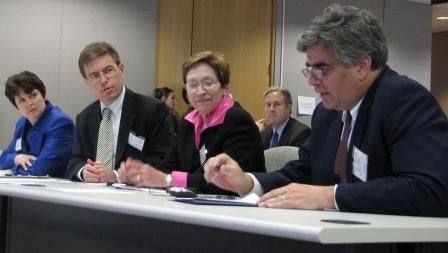What does the information technology sector, the state’s second largest industry employing about 178,000 workers, need to continue to grow and thrive in Massachusetts?
How about a laundry list: more widespread accessibility to broadband Internet service, more robust science and technology educational curriculum for students, incentives for non-IT industries to adopt technology products and more funding for startup and entrepreneurial technology companies, among others.
IT leaders voiced all these concerns and more at a legislative forum discussing the importance of the IT sector in an event at EMC’s Franklin manufacturing facility. The forum, which included the legislature’s Joint Committee on Economic Development and Emerging Technologies, was organized by State Sen. Karen Spilka, D-Ashland.
“Basically, there is no one big ‘Ah-ha’ thing we can do,” said Pat Larkin, director of the John Adams Innovation Institute at the Massachusetts Technology Collaborative in Westborough. “It’s about a process of innovation that needs to always be happening.”
Key Sector
The University of Massachusetts Donahue Institute presented some of the findings of a report it compiled on the state’s IT sector. Among its findings was the fact that IT is the state’s second largest employment sector, behind only health care, which employs more than 300,000 workers in Massachusetts.
There are an estimated 10,300 IT companies in the state, but all has not been rosy for the sector. Researchers found that employment in the sector has fallen by about 25 percent since the height of the tech bubble in 2000. The report also noted that software services are growing across the state while hardware services are decreasing.
Massachusetts is definitely a leader when it comes to capturing venture investment in IT. Bay State companies received nearly $10,000 in venture capital funding per IT worker in the state, second only to California.
The sector is not just important because of its direct impact on the economy through jobs and investments, but also because IT supports many other industries in the state, said Lynn Griesemer, executive director of the Donahue Institute.
For example, some of the state’s other strongest sectors, such as health care, life sciences and defense, are all “IT-intensive” industries, she said, meaning the companies in those sectors make large investments in technology to drive their products and create new ones.
“IT really serves as a backbone to the state’s economy,” she said.
IT is also important for the MetroWest region, according to Paul Matthews, executive director of the 495/MetroWest Partnership, which advocates for the region on statewide issues.
MetroWest, Matthews said, has a 38 percent higher concentration of jobs in IT compared to the national average and an 18 percent higher concentration of IT jobs compared to the rest of the state.
That’s fueled, he said, by some international IT companies that call MetroWest home, including Hopkinton-based EMC Corp., Natick-based MathWorks and Westborough-based eClinicalWorks. Other large international companies also have significant operations in the region including Intel in Hudson, Cisco Systems in Boxborough and IBM in Littleton and Westford.
Despite all the strengths of the industry, those in it said the state could do more to help foster IT growth in Massachusetts.
One repeated theme throughout the day of testimony before members of the committee was the need for a continued pipeline of new workers to support the industry.
“We cannot spend enough time talking about the importance of education,” said Paul Dacier, executive vice president and general counsel for EMC.
The state does have a science, technology, engineering and math fund that aims to coordinate curriculum for young students as early as the kindergarten level through college, but IT leaders urged the state legislators to continue funding those programs and to expand them.
Tom Hopcroft, president of the Massachusetts Technology Leadership Council, a trade group for IT companies in the state, said ubiquitous high-bandwidth connectivity is important to help foster growth of IT across the state.
IT companies need access that infrastructure to make investments in Massachusetts, he said.
William Luster, executive director of the North Shore Alliance for Economic Development, said one suggestion he had is to provide non-IT sector companies tax incentives to invest in IT products. IT products, he said, can create efficiencies in the companies while providing indirect support for the IT industry.

